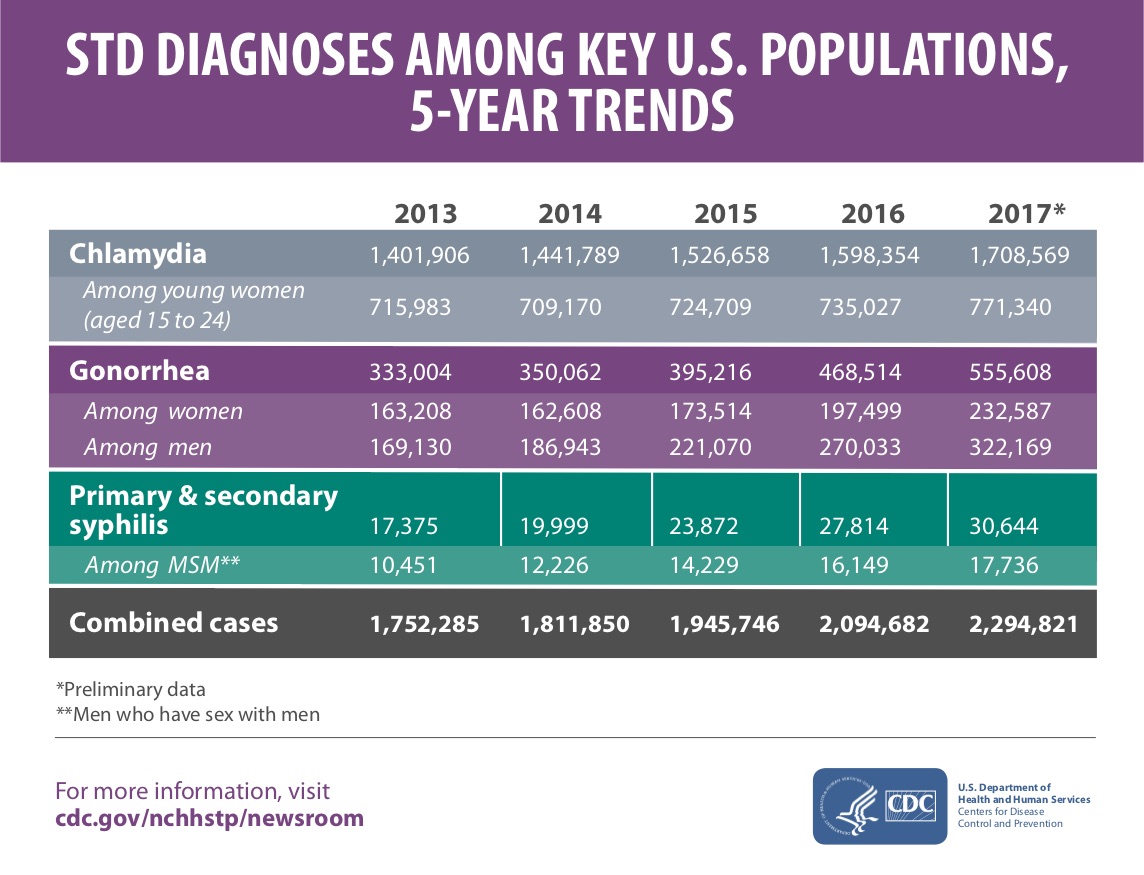Three types of sexually transmitted diseases (STDs) are on the rise, with an almost 10 percent increase between 2016 and 2017, according to preliminary data from the Centers for Disease Control and Prevention (CDC).
Nearly 2.3 million cases of chlamydia, gonorrhea, and syphilis were reported in the United States in 2017. That’s 200,000 more than in 2016, according to CDC data, and an all-time high. It’s also part of an upward trend that the CDC has recorded over the previous three years.

Gonorrhea diagnoses increased by 67 between 2013 and 2017. Syphilis diagnoses nearly doubled over the same period, with most cases in men who had sex with other men. At 1.7 million diagnosed cases, chlamydia was the most common condition reported to CDC in 2017.
The data was released during the CDC’s 2018 STD Prevention Conference, which ended Aug. 30. Particularly troubling to researchers and physicians is the resistance that gonorrhea is showing to almost every antibiotic but ceftriaxone.
Three years ago, the CDC started recommending that people get a single shot of ceftriaxone with an oral dose of azithromycin to help delay the development of resistance to ceftriaxone.
It seems to have worked so far, but now, an increase in resistance to azithromycin is being seen. One percent of gonorrhea lab samples were resistant to it in 2013, with more than 4 percent in 2017.
The other area of concern for medical professionals is lack of funding for education, prevention, research, and treatment of STDs.
Michael Fraser, executive director of the Association of State and Territorial Health Officials said he believes that part of the increase in STD diagnoses is due to a decrease in state and federal funding for prevention efforts.
“We know what works with STD prevention. We just don’t necessarily want to pay for all of it,” he said on a conference call with reporters. “And so we have to really ask ourselves if we are to take this seriously and we want to get on top of this, are we willing to make that investment.”
David Harvey, the executive director of the National Coalition of STD Directors added that another part of the problem is that doctors can be too busy to screen for STDs, and patients don’t know to ask for the tests.
It can also be a difficult conversation to have.
“In our prevention training centers, we’ve shifted the conversation and the starting point of those conversations is not so much you could have a disease, but rather, aren’t you interested in your health?” said Dr. Edward Hook, scientific committee chair at the University of Alabama School of Medicine.”By a focus on sexual health rather than on disease, we’re trying to make those conversations easier.”
He added that because most people who spread STDs don’t know they have them, educating the public about things such as how STDs don’t always have symptoms will encourage people to get regularly tested.
The opioid epidemic may also be playing a role in the numbers. Harvey said there has been an increase in babies born with syphilis, and at least part of that he attributes to mothers who are trading sex for drugs.
Some of the progress he sees being made is through STD-tailored “express” clinics where people can get screened anonymously. “Express visits” within a health care clinic also show promise, said CDC’s head of Sexually Transmitted Disease Prevention, Dr. Gail Bolan.
Express visits allow people to do certain testing on their own, with minimal help from health providers. Collecting sexual history data electronically before a visit could also cut down on doctors’ time and increase screening, she said.
“I think we’ve got a lot of opportunities,” she said.
From The Epoch Times
